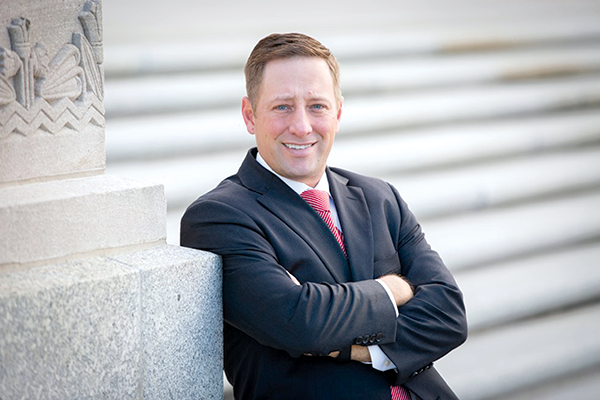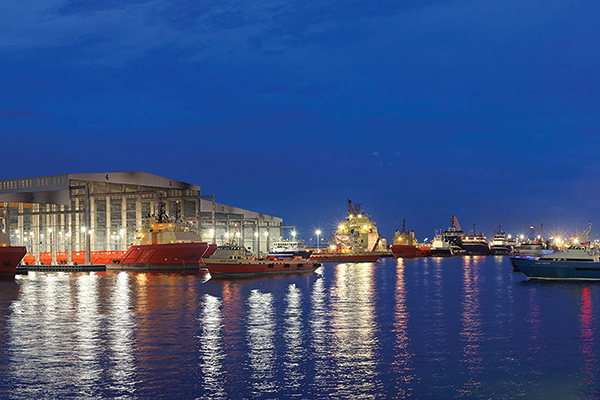
Client Focused Solutions
September 12, 2018
A New Briggs Brings Time-Held Values to LOGA
September 12, 2018FOURCHON A HUGE ECONOMIC ENGINE FOR SOUTH LOUISIANA, ALL OF AMERICA
Let’s go on a local adventure.
Get on Google Maps and search either Houma or Thibodaux.
OK, now, zoom out a little bit and find Grand Isle to the South.
OK, now look a little bit to the west of Grand Isle on the map to the area south of Leeville and Golden Meadow.
Doesn’t look like much, does it? Almost like a few grains of sand, right?
Think again.
That’s Port Fourchon — one of the economic engines that drives all of the business activity in the Houma-Thibodaux area, the state of Louisiana and even in the United States as a whole.
Work is steady at the Port, which is good for the business community locally — especially given the stiff economic downturn that had overtaken the industry for the past several years.
Executive Director Chett Chiasson said folks around the country don’t appreciate Fourchon’s impacts, adding that the average person from Wyoming or Virginia likely won’t even know where the port is.
But to us locally, that little grain of sand is literal economic gold.
“I don’t think people around the country understand what we do,” Chiasson said. “I don’t think people understand the impact that we have on the industry around the United States. The work that we do has a huge impact on the Bayou Community, but also on Louisiana, the Gulf South and the rest of the United States, as well. It all is a ripple effect that eventually touches everyone. For that little piece of the pie to sit right here in our community — it makes us all very proud.”
OK, so exactly what happens on Port Fourchon. Well, the best answer may be a generic one: a lot.
Statistics provided by Port Fourchon indicate that more than 250 companies utilize Fourchon as its base of operations.
The work done, of course, is almost all centered on the oil and gas industry, which makes the next stat even more impressive.
The port is the land base for LOOP, which handles about 15 percent of the country’s domestic oil, about 15 percent of the country’s foreign oil and is connected to 50 percent of the United States’ refining capacity.
In addition to that, Port Fourchon services more than 90 percent of the Gulf of Mexico’s deepwater oil production and the port furnished the country with about 18 percent of its entire oil supply.
Five of the Top 10 Lafourche Parish employers do business from the Port. Nine of the Top 10 Lafourche Parish taxpayers do business in the port.
“It’s a huge operation,” Chiasson said.
And like any other “huge operation”, people are affected when things go good or bad.
When the price of oil soars, oil conglomerates make money hand over fist. Of course, the pie trickles down to management, then to employees — a workforce comprised of men and women mostly from the Houma-Thibodaux area.
More than 15,000 people per month are flown to offshore locations supported by Fourchon.
Thousands others never go offshore, but work jobs at supply companies or at shipbuilders or other businesses who service the port.
So when things go well, so does economic activity locally.
As people make more money and find stability in their work, they’re more likely to buy homes. That affects local realtors. Once a home is secured, they’ll also buy transportation, which affects local car lots. Of course, living in an area means grocery shopping, clothing shopping, occasional medical care and also entertainment, which, of course, affects local business, as well.
As people spend more money, tax collections go up, which means that local government has more funding to provide drainage to local ditches and/or equipment to local public playing fields or parks, among other things.
All this based on the operations happening on that “grain of sand” on the map.
“The old saying is that something is the bread and butter of an area,” LSU economist Dr. Loren Scott said at a local luncheon in which he explained the importance of oil and gas to the area. “But for you folks, Fourchon, the oil and gas industry and the success of it all is the bread, the butter, the farm, the cow and everything else. It dominates industry here.”
And when things go south, it also has dramatic impacts — even in areas one might not realize.
When industry struggles, everything we explained above happens in reverse.
Businesses struggle, if not going under altogether. People get frugal for as long as they can. When becoming frugal for too long is unfeasible, they may move away.
During the start of the economic downturn locally, South Lafourche High School was a Class 5A school — the highest population distinction a school in Louisiana can have.
Today, as the area rebuilds, the school’s enrollment has dropped by hundreds of kids and the school is now Class 4A — a direct result of the economy.
They’re not the only school who felt the pinch.
Because Lafourche schools generate money from tax revenues, when the downturn started, they were left out in the cold.
In the past several years, the school system has been levied a multi-million dollar deficit and has had to lay off support personnel, bus drivers and other employees.
Elsewhere in the area, just look around. It’s not difficult to find the obvious signs of economic suffering. Hundreds of local businesses closed — including longtime staples in our community. Their abandoned buildings are now for sale/rent locally — hopefully part of the next wave coming in the future.
WHAT’S AHEAD?
Like all other oil and gas leaders, Chiasson is optimistic about the future — cautiously optimistic.
He said business has gotten better in the past 6-12 months and trends show that even if there’s not a drastic spike in the price of oil, there likely won’t be a drastic plunge, either.
Stability isn’t bad, according to Chiasson, who added that because of President Donald Trump’s administration working with oil and gas, the break-even point is lower, which means that prices no longer need to be $100/barrel for big business to thrive.
But like anything else, Chiasson also follows history.
He knows that oil and gas life isn’t a smooth street, but it’s rather a road filled with peaks and valleys.
He said he knows there will be booms and he knows there will be busts. The challenge is to make sure that Fourchon is always ready for the next boom and is always in position to withstand the next bust.
“Unfortunately, we have experience dealing with adversity, because we’ve had a lot of it,” Chiasson said. “But like anything else, it makes you stronger. And we take pride in being able to provide everything that we need for our wonderful team of tenants who work hard to keep the industry strong.”•












